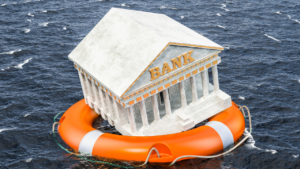
The recent plunge in the markets has once again raised fears about weaknesses in regional banks. The fall of First Republic Bank (FRB) and prompt selling to the country’s biggest bank, JPMorgan Chase, indicates further turmoil in the banking sector.
We are now facing not just a credit crunch … but a credit crisis.
Banks are not making meaningful new loans, and this is a cause for concern. The situation has never been seen before in our lifetime …
Banks have experienced record deposit outflows in recent weeks. The regional lender, FRB, revealed that deposit outflows totaled over $70 billion in the first quarter.
Customers pulled their money from the San Francisco institution following the March 10 failure of Silicon Valley Bank, an event that triggered panic across the banking system and caused depositors to seek the perceived safety of bigger financial institutions. This, in turn, made more banks have issues.

This is a serious situation that investors should not dismiss.
Credit is the lifeblood of the economy and without it, there can be no new loans. Without credit, companies cannot expand, invest or innovate. This means that businesses will suffer, and ultimately, it will be the consumers who will pay the price.
Furthermore, existing loans cannot be extended and may even be called in if the terms allow it. This is a recipe for creating depressions, not just recessions.
The banking sector is a reliable indicator of the state of the credit crisis. Previously, it was just regional banks that were struggling … but now even larger banks are experiencing difficulties.
This is a worrying sign and indicates that the credit crisis is deepening. The situation is beyond the control of the governmental agencies or the Fed, and it is vital that investors take action to address this issue.
Did you know? No local bank in Belize has ever failed. Belize banks liquidity rates are at least 24%, significantly higher than typical American ones. If. hypothetically. a failure of a bank occurred in Belize, the rest of them would be unlikely to fail since most banks are statutorily required to adopt the same liquidity rate.
Alternative Real Asset Investments
The current state of the banking sector can be unsettling for investors — but there are alternative investment options that can provide stability during times of crisis.
One such option is investing in real assets, such as real estate, infrastructure, and commodities.
Real assets are tangible and physical assets that have intrinsic value and can provide a hedge against inflation. Unlike financial assets — which are often subject to market volatility and speculation — real assets can provide a stable source of income and appreciation over the long term.
In Belize, most sales are in cash using no leverage which allows for no counter party risk and is a bit sager than a loan with a bank. So if there is a crash, you can have an asset in Belize with no leverage, diversified outside North America, and that can make a great recipe to weather a storm.
Investing in real estate, for example, can provide a steady stream of rental income and potential appreciation in property value.
Infrastructure investments, such as toll roads or airports, can also provide a reliable source of income from usage fees.
Commodities, such as gold or oil, can provide a hedge against inflation and market volatility. In times of crisis, real assets can provide stability and diversification for investors looking to move capital away from the banking sector.
This is because real assets are not directly tied to the performance of financial institutions and can provide a more reliable source of income and appreciation.
Moreover, investing in real assets can also help to support the development of essential infrastructure and services, which can have a positive impact on local communities and the broader economy.
Of course, investing in real assets also comes with its own set of risks and challenges.
Real estate, for example, can be subject to fluctuations in property values and rental demand — while infrastructure investments can be impacted by changes in usage patterns or technological disruptions. Commodities are also subject to fluctuations in supply and demand and can be impacted by global geopolitical events.
Investors should carefully consider their investment goals and risk tolerance before investing in real assets. It’s important to conduct thorough due diligence and seek the advice of qualified financial professionals before making any investment decisions.
How You Can Protect Your Wealth in Times of Crisis
In conclusion, the current state of the banking sector and credit crisis highlights the need for investors to consider alternative investment options. Real assets can provide stability, diversification, and a hedge against inflation during times of crisis.
By investing in real assets, investors can move capital away from the banking sector and support the development of essential infrastructure and services, while also potentially generating attractive returns over the long term.
We urge investors to take action to protect their wealth before it is too late.
If you’d like to learn more about your investment options with Caribbean Capital Group, please reach out or schedule a call here.



